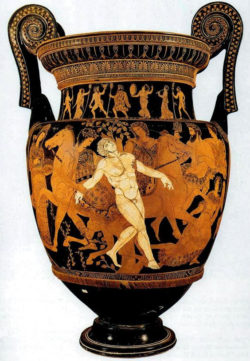On Technically Enhanced Man by James V. Schall, S.J.
James V. Schall, S.J. on the “progress” towards the integration of machines into humans. This seems very much a case of something we can do but shouldn’t.
Whether a technically enhanced Schall would be an improvement over the original version is probably something that I, though admittedly equipped with battery-powered hearing aids, do not have to worry about. But most other folks do. A nephew sent me a list of “The 50 Smartest Companies.” I did not quite know what to make of it.
So I sent a query to a friend who is up to speed on these things. He noted that a remarkable number of these “smartest” companies work on the human condition itself. The human “instrument” that is man’s body and mind can be radically improved.

Death of the automaton Talos, c. 350 B.C. National Archaeological Museum, Puglia, Italy.
Here is my friend’s summation:
“I think the big trend relative to tech innovation is technology as intertwined with human beings. And I don’t mean humans using technology. I refer to having technology inserted into our bodies – and brains – and even being directly connected with computers.”
People already have heart-pacers that need recharging every so often. Doctors today deftly perform operation with hand-extending robot devices. Presumably if a baby in the womb is diagnosed with a low IQ, some chip can be inserted into the little tyke to get him into Harvard when the time comes. We have watches that tell us how many miles we walk, calories we eat, and the vagaries of our blood pressure.
Computer mechanisms have become so small that they can be inserted anywhere from the brain to the big toe silently to perform the function for which they were designed. Soon, we can recharge our batteries by walking near an outlet. Batteries will last for decades. I had a watch battery that lasted five years.
Descartes thought that, while we could know nothing of reality outside of ourselves, we could construct even the human body so that we could not tell the difference between the real one and the one that was his own manufacture. How could he compare what he did not know with what he made?
Click here to read the rest of Father Schall’s column . . .
James V. Schall, S.J.
James V. Schall, S.J., who served as a professor at Georgetown University for thirty-five years, is one of the most prolific Catholic writers in America. Among his recent books are The Mind That Is Catholic, The Modern Age, Political Philosophy and Revelation: A Catholic Reading, Reasonable Pleasures, and, new from St. Augustine’s Press, Docilitas: On Teaching and Being Taught.



Leave a Reply
Want to join the discussion?Feel free to contribute!